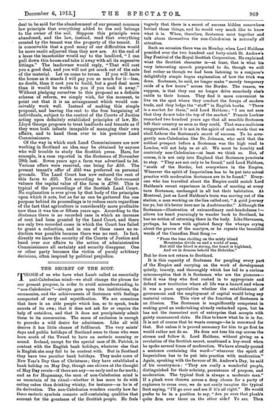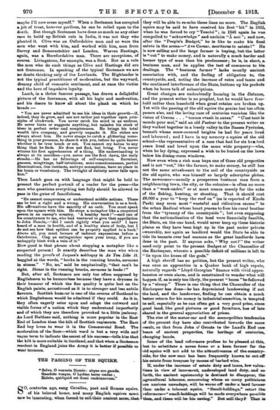THE SECRET OF THE SCOT.
THOSE of us who have what Lamb called an essentially anti-Caledonian mind—we shall change the phrase for our present purpose, in order to avoid misunderstanding, to "non-Caledonian "—always gaze upon the institutions, the ceremonies, and the achievements of Scotsmen with feelings compacted of envy and mystification. We are conscious that here is an able people which has, so to speak, trade secrets of its own; that it does not ask for or require the help of outsiders, and that it does not precipitately admit them to its communion. The sense of exclusion is enough to provoke a wild desire for admittance. Like all wild desires it has little chance of fulfilment. The very saints' days and public holidays of Scotland seem to those who were born south of the Tweed to have an esoteric meaning or sound. Ireland, except for the special case of St. Patrick, is content with the English bank holidays, whatever else that is English she may fail to be content with. But in Scotland they have two peculiar bank holidays. They make more of New Year's Day than of Christmas ; they have established a bank holiday on May Day, though one shivers at the thought of May Day revels—if there are any—so early and so far north ; and as for Hogmanay, the man of non-Caledonian mind is as uncertain of ita ritual—whether it has more to do with eating cakes than drinking whisky, for instance—as he is of its derivation. The non-Caledonian wonders exactly how far these esoteric symbols connote self-containing qualities that account for the greatness of the Scottish people. He feels
vaguely that there is a secret of success hidden somewhere behind these things, and he would very much like to know what it is. When, therefore, Scotsmen meet together and talk about themselves the non-Caledonian is naturally all attention.
Such an occasion there was on Monday, when Lord Haldane presided over the two hundred and forty-ninth St. Andrew's Day Festival of the Royal Scottish Corporation. He explained what the Scottish character is—at least, that is what his very interesting speech purported to do, though we still feel rather as though we had been listening to a conjurer'. delightfully simple bogus explanation of how the trick was done. Scotsmen, he said, no longer make "merely temporary raids of a few hours" across the Border. The reason, we suppose, is that they can no longer drive somebody else's cattle to their homes. They find it more convenient to live on the spot where they conduct the forays of modern trade, and they lodge the " stuff " in English banks. "There is a market for them," said Lord Haldane ; "I am not sure that they do not take the top of the market." Francis Lockier remarked two hundred years ago that all sensible Scotsmen left their country as soon as they could, That was a malicious exaggeration, and it is not in the spirit of such words that we shall fathom the Scotsman's secret of success. To be arro- gantly non-Caledonian like Dr. Johnson, who said that the noblest prospect before a Scotsman was the high road to London, will not help us at all. We must be humbly and contritely non-Caledonian—at least we think so. But, of course, it is not only into England that Scotsmen penetrate to stay. "They are not only to be found," said Lord Haldane, "south of the Border, but everywhere in the Empire.
Wherever the spirit of Imperialism has to be put into actual practice with moderation Scotsmen are to be found." Every- one who has travelled about the Empire could match Lord Haldane's recent experience in Canada of meeting at every
turn Scotsmen, unchanged in all but their habitation. At Montreal, just as Lord Haldane's train was moving out of the station, a man working on the line called out, "A guid journey
tae ye, but it's better here nor in Auchterarder." Although the Scotsman—illustration of extraordinary cool-headedness !- allows Ins heart yearningly to wander back to Scotland, he has no notion of returning there in the body. Like Stevenson, perhaps, he hears with agitated fancy the whaups crying about the graves of the martyrs, or he repeats the beautiful words of the Canadian Boat Song :—
"From the lone shelling on the misty island Mountains divide us and a world of seas, But still the blood is strong, the heart is highland, And we in dreams behold the Hebrides."
But he does not return to Scotland.
It is this capacity of Scotsmen for peopling eveiy part of the Empire and carrying on the work of development quietly, bravely, and thoroughly which has led to a curious misconception that it is Scotsmen who are the pioneers— that it was they who first rushed in to appropriate and defend new territories where all life was a hazard and where it was a pure speculation whether the establishment of government and the employment of capital would bring any material return. This view of the function of Scotsmen is an illusion. The Scotsman is magnificently competent in making good an undertaking already embarked upon, but he has not the insouciant sort of enterprise that accepts with
gaiety unmeasured risks. He likes to know what he is in for. It is not of course that he wants courage—he is renowned for that. But unless it is proved necessary for him to go first he would rather not do so. He does not toss his cap across the stream and follow it. Lord Haldane, without giving us a revelation of the Scottish secret, mentioned a key-word when he spoke several times of moderation. We have already quoted a sentence containing the word—" wherever the spirit of Imperialism has to be put into practice with moderation." Again, speaking with the fervour of St. Andrew's Day, he said of his countrymen : "They are really a wonderful people, distinguished for their sobriety, persistence of purpose, and moderation. The typical Scot is always a moderate man." If a plank were thrown across a deep chasm for a party of explorers to cross over, we do not easily imagine the typical Scot saying, "I'll go over and see if it's all right." He would prefer to be in a position to say, "Are ye sure that plank's quite firm over there on the other side? Ye arc. Then
maybe I'll now cross myself." When a Scotsman has accepted a job of trust, however perilous, he can be relied upon to the death. But though Scotsmen have done as much as any other race to build up British rule in India, it was not they who planted it. Clive was an Oxfordshire man and so were the men who went with him, and worked with him, men from Surrey and Somersetshire and London. Warren Hastings, again, was a Herefordshire man. There are exceptions, of course. Livingstone, for example, was a Scot. But as a rule the men who do such things as Clive and Hastings did are not Scotsmen. In speaking of the typical Scotsman we are no doubt thinking only of the Lowlands. The Highlander is not the typical practitioner of moderation, but the wayward, dreamy child of romantic sentiment, and at once the victim and the hero of impulsive loyalty.
Lamb, in a thrice famous passage, has drawn a delightful picture of the Scotsman, with all his logic and moderation, and his desire to know all about the plank on which he treads :— " You are never admitted to see his ideas in their growth—if, indeed, they do grow, and are not rather put together upon prin- ciples of clockwork. You never catch his mind in an undress. He never hints or suggests anything, but unlades his stock of ideas in perfect order and completeness. He brings his total wealth into company, and gravely unpacks it. His riches are always about him. He never stoops to catch a glittering some- thing in your presence, to share it with you, before he quite knows whether it be true touch or not. You cannot cry halves to any thing that he finds. He does not find, but bring. You never witness his first apprehension of a thing. His understanding is always at its meridian—you never see the first dawn, the early streaks.—He has no falterings of self-suspicion. Surmises, guesses, misgivings, half-intuitions, semi-consciousnesses, partial Illuminations, dim instincts, embryo conceptions, have no place in his brain or vocabulary. The twilight of dubiety never falls upon him."
Then Lamb goes on with language that might be held to present the perfect portrait of a reader for the press—the man who questions everything lest folly should be allowed to pass in the guise of fancifulness.
"He cannot compromise, or understand middle actions. There can be but a right and a wrong. His conversation is as a book. His affirmations have the sanctity of an oath. You must speak upon the square with him. He stops a metaphor like a suspected person in an enemy's country. 'A healthy book !'—said one of his countrymen to me, who had ventured to give that appellation to John Bunele,—• did I catch rightly what you said? I have heard of a man in health, and of a healthy state of body, but I do not see how that epithet can be property applied to a book.' Above all, you must beware of indirect expressions before a Caledonian. Clap an extinguisher upon your irony, if you are unhappily blest with a vein of it."
Bow good is that phrase about stopping a metaphor like a
suspected person! It exactly describes the man who when reading the proofs of Jaques's soliloquy in As You Like It. boggled at the words, "books in the running brooks, sermons
In stones." "No, no," said he emphatically, "that can't be right. Stones in the running brooks, sermons in books !"
But, after all, Scotsmen are only too often supposed by Englishmen to be humourless because they have a dryness in their humour of which the flue quality is quite lost on the English palate, accustomed as it is to stronger and less subtle Savours. Scottish humour is one of the arcana of Scotland to which Englishmen would be admitted if they could. As it is, they often eagerly seize upon and adopt the outward and visible forms of a nation which they understand imperfectly and of which they are therefore provoked to a little jealousy. As Lord Haldane said, nothing is more popular in the East End of London than the kilt of Scottish regiments. The East End boy loves to wear it in the Commercial Road. The moderation of the Scot—which word is but a very wide and vague term to indicate the secret of his success—tells him that the kilt is more suitable in Scotland, and that when a Scotsman resident in England joins the Army it is better if possible to wear trousers.



































































 Previous page
Previous page